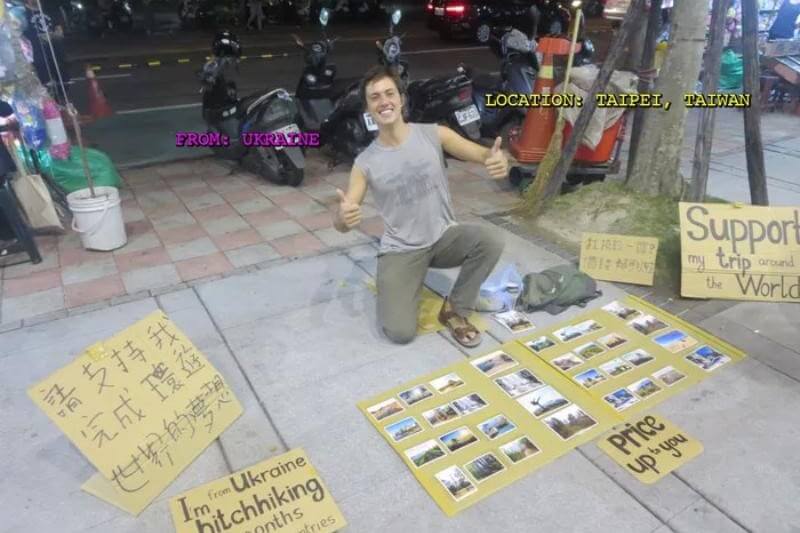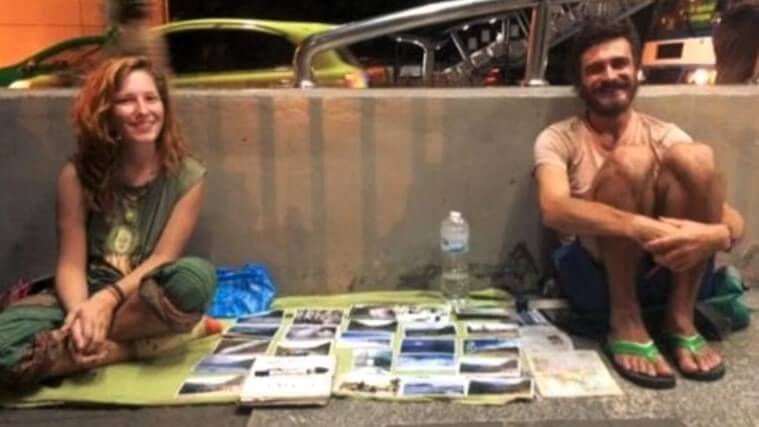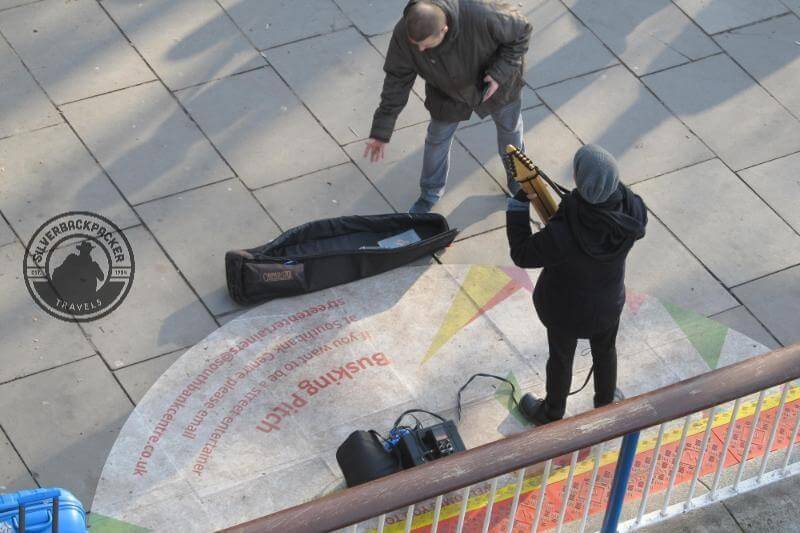The Ethical Dilemma of Begpacking
Then and NowThe Ethical Dilemma of Begpacking: Then and Now
In recent years, a controversial trend among budget travellers has emerged, commonly referred to as begpacking. This term describes a subset of travellers who, often in economically disadvantaged countries, rely on begging, busking, or selling handmade goods to fund their journeys.
While some argue that begpacking is a form of creative, resourceful travel, others raise serious concerns about the ethics and implications of such behaviour. To better understand the complexities of begpacking, it’s useful to examine both its pros and cons, the cultural shifts it has triggered, and the role of social media in amplifying the debate.

The Pros of Begpacking
Cultural Exchange
One of the positive aspects often cited by begpackers is the potential for cultural exchange. By busking or performing on the streets, these travellers often share elements of their own culture—such as music, art, or craftwork—with locals and other visitors. This can enrich the cultural fabric of a place, adding vibrancy and diversity to local street life.
Accessible Travel
Begpacking offers a way for those with limited financial means to travel, making exploration accessible to people who might not otherwise have the resources to do so. For some, this form of travel allows them to pursue their dreams of seeing the world, despite economic constraints.
Resourcefulness and Creativity
Many begpackers show great ingenuity in funding their travels. Whether through street performances, selling art, or offering small services, they often find creative ways to sustain their journey. This resourcefulness can inspire others to think outside the box and engage with travel in innovative, unconventional ways.
Tourism Inclusivity
Begpacking could potentially encourage a wider range of people to experience travel, extending the joy of exploration beyond those with higher financial resources. This could lead to a more diverse array of tourists engaging with different cultures and environments.
The Cons of Begpacking
Ethical Concerns
The primary criticism of begpacking revolves around the ethical implications of begging or busking in countries where many people are already struggling to meet their basic needs. In poorer regions, the sight of a foreigner begging for money can be seen as exploitative or disrespectful, especially if the begpacker has the means to return home but chooses not to.
Privilege and Perception
A key issue is the perception that begpacking is a display of privilege. Critics argue that travellers relying on begging or busking often come from wealthier countries and have safety nets—such as family or the ability to buy a plane ticket home—making their actions seem entitled or tone-deaf. In contrast, locals who beg do so out of genuine necessity, not as a lifestyle choice.
Legal and Social Issues
In many countries, begging, selling goods without a permit, or performing without a licence can be illegal. Engaging in begpacking without adhering to local regulations may result in fines, deportation, or other legal consequences. Even when it’s not illegal, it can create friction between tourists and locals, particularly when it strains local resources.
Strain on Local Resources
In poorer areas, begpacking can drain the goodwill of the community. The attention and resources that begpackers receive may divert support away from locals in greater need. This can breed resentment and potentially harm the reputation of other travellers.
Reputation Impact
Begpacking can tarnish the image of backpackers and budget travellers as a whole. If begpackers are seen as freeloaders, it can result in negative perceptions of all travellers, even those who contribute positively to the local economy and culture.

Key Considerations for Responsible Travel
While begpacking may appear harmless to some, it’s crucial to consider responsibility, context, and sustainability in travel. Ethical begpacking involves respecting local customs, laws, and social dynamics. In places with vibrant street cultures, busking or selling goods may be acceptable; in poorer regions, however, such actions could easily be perceived as exploitative.
Instead of relying on begging or busking to fund a trip, travellers should aim to use their own resources or seek sustainable, responsible ways to engage with host communities.

The Shift in Perception: From the 1960s to Today
In the 1960s and 70s, the notion of travelling with little money was romanticised, especially among counterculture movements. Hitchhiking, bartering, and busking were seen as symbols of a free-spirited, anti-materialist lifestyle. Figures like Jack Kerouac, with his book “On the Road” embodied the ideal of the “wandering traveller,” thriving on minimal resources as part of a rejection of societal norms.
However, the rise of social media has fundamentally altered how such behaviours are perceived. Today, the visibility of travellers’ actions is amplified by platforms like Instagram, TikTok, and Facebook. Begpacking incidents that once may have gone unnoticed now go viral, often attracting intense criticism.
The Role of Social Media in Shaping Public Opinion
Social media has made travellers’ actions far more visible, allowing them to be scrutinised by a global audience. Videos of begpackers asking for money or performing in impoverished areas often spark outrage, and the “call-out culture” of social media can lead to swift and widespread condemnation.
This heightened visibility, combined with increased cultural sensitivity and awareness of global inequalities, has shifted the perception of begpacking from an acceptable part of the traveller ethos to an exploitative behaviour.
Social media also fosters an environment where local voices—those directly impacted by begpacking—can more easily be heard. In the past, these concerns might have been isolated, but now they are shared and amplified, creating a platform for discussions about the ethics of tourism.

Lessons from Recent Controversies
The cases of Russian begpackers in Southeast Asia (2019) and a European couple in Bali (2020) highlight some of the key issues surrounding begpacking. In both instances, travellers were photographed engaging in activities like selling trinkets or using their children to elicit sympathy, leading to widespread backlash.
Many critics pointed out that such actions were tone-deaf in countries where poverty was already a significant issue. These incidents not only sparked public outrage but also led to stronger enforcement of immigration and visa rules, with some begpackers being detained or deported.
These high-profile cases illustrate the complexities of begpacking in a globalised world. What might have once been viewed as part of a bohemian, minimalist lifestyle is now often seen as a form of privilege that exploits vulnerable communities.

Shaping Future Tourism Practices
The begpacking phenomenon has led to significant shifts in how tourism is perceived and managed. Governments in popular tourist destinations have introduced stricter immigration rules to prevent such practices, while global awareness campaigns are encouraging more responsible, ethical travel. Many travellers are now expected to contribute positively to the economies they visit, either through responsible spending or by supporting local businesses rather than relying on charity.
Moreover, the scrutiny of begpacking has contributed to a broader dialogue about ethical tourism, with a growing emphasis on cultural respect, social responsibility, and sustainable practices. As travel becomes increasingly accessible, it’s vital that travellers remain mindful of their impact and consider the privileges they may take for granted.
The Balance Between Nostalgia and Reality
While the freewheeling travellers of the 1960s, 70s and 80’s were celebrated for their rejection of materialism and embrace of the road less travelled, today’s travellers must balance that spirit of adventure with a deeper awareness of the ethical implications of their actions. Begpacking, once romanticised, now faces a much sharper lens of scrutiny.
In the end, the debate surrounding begpacking underscores the broader evolution of travel culture. As travellers become more conscious of their impact on host communities and the environment, the hope is that this awareness will foster a more respectful and sustainable approach to global exploration.

Essential Travel Guides
The Ethical Dilemma
of Begpacking:
Then and Now
Check Out These Related Posts
Tourist vs Traveller: The Great Debate
Uncovering the Truth Behind Location Independence Myths
If you enjoyed reading “The Ethical Dilemma of Begpacking: Then and Now” then please share this page with your friends.
Leave a comment below to let me know what you liked best.
Follow Silverbackpacker on Facebook, Instagram ,Twitter and Pinterest for more travel adventures and be notified about my latest posts and updates!
Thankyou for sharing 🙂
Please Note – All blog post photos on Silverbackbacker.com are of a lower quality to enable faster loading and save you data. If you would like to buy or license higher quality copies of any of the photographs you can email us at silverbackpackertravels@gmail.com
All photographs and content on this website remain the property of Silverbackpacker.com. Images may not be downloaded, copied, reproduced or used in any way without prior written consent.
Print purchases entitle the purchaser to the ownership of the image but not to the copyrights of the image which still remain with Silverbackpacker.com even after purchase.
Follow Silverbackpacker for more of his Travels
Facebook @silverbackpacker | Instagram @silverbackpacker
Twitter @silverbackpaker | Pinterest @silverbackpaker
Audere Est Facere – Silverbackpacker.com – To Dare is To Do
Affiliate Disclaimer: Links on this website may be affiliate links that could result in us receiving compensation when you purchase a product or service from that link. You do not pay any extra fees for these items. This helps us to keep this website going. Thank you for your support.
Disclaimer | Privacy Policy | Cookie Statement © All Rights Reserved

